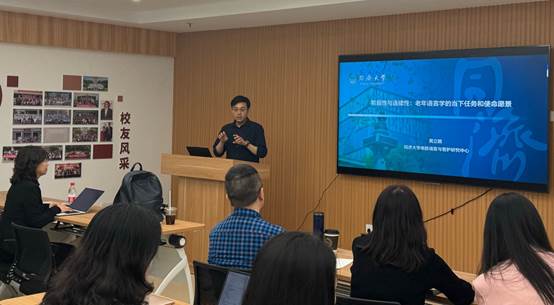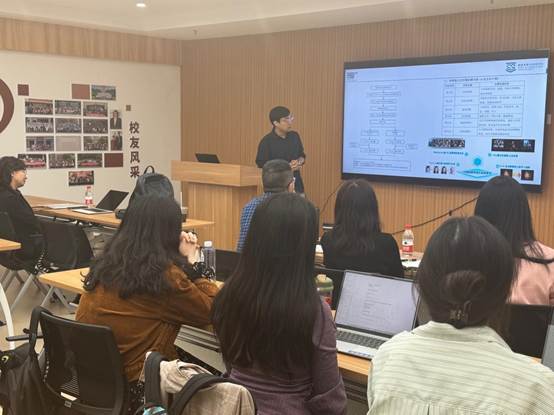On the afternoon of April 24, the 60th Zijin Lecture was held successfully at Room 201 of East Building 5, by the School of International Studies, Zhejiang University. The lecture, entitled “Stages and Continuity: The Current Tasks and Visionary Missions of Gerontolinguistics”, was delivered by Prof. HUANG Lihe from School of Foreign Studies, Tongji University, and moderated by Prof. ZHOU Peng from School of International Studies, Zhejiang University.

Prof. HUANG introduced the concept of gerontolinguistics from the perspective of the life course. He indicated that, when viewed in the context of the entire human lifespan, individual development constitutes a continuum. Throughout the process of growth, physiological, cognitive, and social-emotional factors are constantly evolving and interplaying, giving rise to distinct developmental phases within lifespan. The evolution of linguistic competence mirrors this pattern. The development, maintenance, and decline of an individual’s language skills unfold along the timeline of their entire life course. Prof. HUANG pointed out that past research has predominantly focused on the linguistic trajectories and patterns of a certain age, which reflects the “staged” aspect of linguistic research from an ontogenetic perspective. However, linguistic research is also expected to elucidate the overarching trends and the comprehensive picture of language development across an individual’s lifetime, contributing to the establishment of a linguistic knowledge system that encompasses the entire life cycle, thereby embodying the characteristic of “continuity”. Consequently, the study of gerontolinguistics is of significant value.
Prof. HUANG then briefly introduced the research methodologies in gerontolinguistics from a life-span developmental perspective. After providing a concise review of current research, he suggested that longitudinal research is encouraged for future studies and large-scale databases are expected to be set up. Furthermore, he proposed that interdisciplinary approaches, e.g., psychology, neuroscience, behavioral genetics, and linguistics, can be applied for mutual enhancement and common development of disciplines.

Lastly, Prof. HUANG shared the research ideas and outcomes of his team. Starting from the life course theory, he introduced the preliminary results of a multimodal life review narrative intervention. This program integrates concepts and techniques from reminiscence therapy, narrative therapy, and multimodal stimulation, which can help the elderly with mild cognitive impairment to maintain cognitive-linguistic health. The research indicates that the therapy can foster a positive mental and psychological state among the elderly, activate and enhance autobiographical memory, boost self-efficacy, and improve social interaction skills, thereby enhancing the quality of life.
Prof. HUANG’s lecture fully demonstrated the integration of linguistic research with significant societal needs, providing enlightenment on how linguistic research can work for the society. During the Q&A session, the attendees engaged with Prof. HUANG on the issues related to intervention design scheme and geriatric pragmatics, followed by Prof. ZHOU Peng’s brief summary of the lecture. The lecture concluded successfully amidst lively interactions among the students and teachers.
Text/Photos: ZHOU Xin’an
Revised by: ZHOU Peng
Zijin Club
April 25, 2024
Translated by XIA Peiquan, Proofread by XU Xueying



